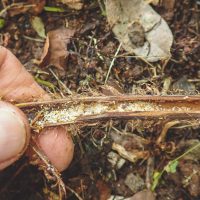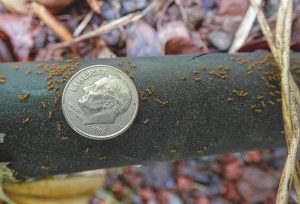
Residents are being asked to help stamp out a new ant pest that has been discovered in the territory.
Because of the harm it may cause to agriculture, the environment, and the economy of American Samoa, local officials are hoping to contain and eradicate the little fire ants before they spread and become established.
The American Samoa Department of Agriculture and the American Samoa Community College’s (ASCC) entomology lab advised in a release today that they have detected a new ant pest on Tutuila island.
Dr. Casper Vanderwoude of the University of Hawaii Ant Lab has confirmed the new invader to be the little fire ant, *Wasmannia auropunctata*.
Though native to Central and South America, this tiny ant has been spreading into many Pacific islands, including Hawaii, Guam, New Caledonia, French Polynesia, Solomon Islands, Vanuatu, Wallis and Futuna, and Papua New Guinea.

Photos: ASCC-ACNR
“The little fire ant is much smaller than the tropical fire ant, which first appeared in American Samoa 16 years ago, but its sting is similar in the pain and itchiness it causes,” said ASCC Agriculture, Community and Natural Resources Division’s Entomologist Dr. Mark Schmaedick.
“Unlike the tropical fire ant, the little fire ant often forages and nests in trees. This habit makes it a serious nuisance to farmers and gardeners who may get stung by numerous ants falling onto them as they prune or harvest their crops.”
According to the release, the ant is also a danger to local ecosystems as it is an aggressive predator and competitor, attacking native ants and other insects, reptiles, and baby birds.
“The little fire ant causes indirect damage to plants through its relationship with sap sucking insect pests such as aphids, mealybugs, scales, whiteflies, and psyllids,” said Dr. Schmaedick.
They have been detected only in the Tafeta area, but it is likely that there are infestations elsewhere on Tutuila.
Little fire ants spread very slowly on their own, but can spread quickly by hitchhiking on items that people carry around such as potted plants, plant cuttings, tiapula, banana suckers, rolled mats, coconuts, firewood and other objects that may have been in contact with the ground.
People who live in areas infested with little fire ants are asked to please avoid transporting these kinds of items to other areas of the island to avoid spreading the little fire ants.
Anyone who has questions or who wishes to report a possible infestation of little fire ants can call the ASCC-ACNR Land Grant at 699-1575.



